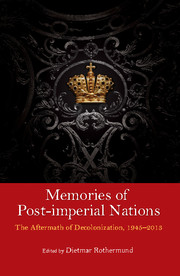Book contents
- Frontmatter
- Contents
- Preface
- Introduction
- 1 Memory of Empire in Britain: A Preliminary View
- 2 Ruptures and Dissonance: Post-colonial Migrations and the Remembrance of Colonialism in the Netherlands
- 3 A Distinctive Ugliness: Colonial Memory in Belgium
- 4 The Post-colonial Encounter in France
- 5 Ideologies of Exceptionality and the Legacies of Empire in Portugal
- 6 Post-colonial Italy: The Case of a Small and Belated Empire: From Strong Emotions to Bigger Problems
- 7 Post-imperial Japan in Transnational Perspective
- 8 Memories of Post-imperial Nations
- 9 A View from the Gallery: Perspective of a ‘Colonized’ on Post-imperial Memories
- Contributors
- Index
3 - A Distinctive Ugliness: Colonial Memory in Belgium
Published online by Cambridge University Press: 05 September 2015
- Frontmatter
- Contents
- Preface
- Introduction
- 1 Memory of Empire in Britain: A Preliminary View
- 2 Ruptures and Dissonance: Post-colonial Migrations and the Remembrance of Colonialism in the Netherlands
- 3 A Distinctive Ugliness: Colonial Memory in Belgium
- 4 The Post-colonial Encounter in France
- 5 Ideologies of Exceptionality and the Legacies of Empire in Portugal
- 6 Post-colonial Italy: The Case of a Small and Belated Empire: From Strong Emotions to Bigger Problems
- 7 Post-imperial Japan in Transnational Perspective
- 8 Memories of Post-imperial Nations
- 9 A View from the Gallery: Perspective of a ‘Colonized’ on Post-imperial Memories
- Contributors
- Index
Summary
And indeed, to this day one sees in Belgium a distinctive ugliness, dating from the time when the Congo colony was exploited without restraint and manifested in the macabre atmosphere of certain salons and the strikingly stunted growth of the population, such as one rarely comes across elsewhere. At all events, I well recall that on my first visit to Brussels in December 1964 I encountered more hunchbacks and lunatics than normally in a whole year.
Is Belgium an anomaly among European nation-states? Claims about the artificiality of Belgium are as old as the Belgian state itself. These claims have been revived since the 1970s and the centrifugal sequence that has transformed Belgian constitutional apparatus in the direction of confederalism and increased the gap between the country's main linguistic constituencies – the Dutch-speaking inhabitants of Flanders and the French-speaking inhabitants of Wallonia and of Brussels (a city itself enclosed inside the Flemish territory). Several historians, most recently Martin Conway, have argued against the so-called inherent artificiality of the Belgian state, showing instead the contingent character of sub-national separatism and the historical entrenchment of Belgian national feelings. Other scholars have underlined the exemplary dynamic of decentralization and regional autonomy in Belgium as emblematic of state transformations in the context of European integration. Yet, participants in the debates around Belgian exceptionalism have ignored the history and legacy of Belgian imperialism in Africa.
What is the relevance of Belgium's colonial past in Central Africa for understanding its current identity and institutional crisis? Historians have commented on the causal connection between decolonization and Belgium's investment in European integration, but they have usually only hinted at the near simultaneity of imperial retreat and national unraveling as mere coincidence or anecdote. It is indeed challenging to clearly highlight effective connections between the two processes. The institutional, cultural, and economic specificities of Belgian Congo, its relative autonomy with regard to the core of the state apparatus and its relative ignorance by the Belgian public, have contributed to render colonialism a detachable appendix, a dispensable chapter in Belgian national history.
- Type
- Chapter
- Information
- Memories of Post-Imperial NationsThe Aftermath of Decolonization, 1945–2013, pp. 58 - 75Publisher: Cambridge University PressPrint publication year: 2015
- 4
- Cited by



